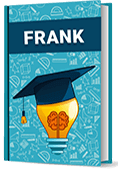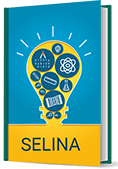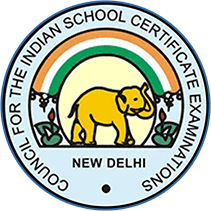
ICSE
(Indian Certificate of Secondary Education)
The Council for the Indian School Certificate Examinations (CISCE), commonly known as the ICSE, was proposed by Maulana Abul Kalam Azad to replace the Cambridge School Certificate Examination. In December 1967, the Council was registered as a Society under the Societies Registration Act, 1860. In 1973, the Council was listed in the Delhi School Education Act 1973 as a body conducting public examinations.
Headquartered in New Delhi today, ICSE is among India's popular boards of education, with over 2500+ affiliated schools all over the country. ICSE classes and examinations are conducted in English, except for the Indian Languages classes and exams. The Council focuses on a student's overall growth, thus providing a balanced curriculum to all its learners.
Select Your Class
ICSE is an all-India, but not a government board of education. It prescribes a curriculum to balance academics and extracurricular activities, implementing theme-based learning to identify students' skills and encourage them to learn via projects and experiences. ICSE classes are designed to develop students' interest in the skills of their choice apart from academics.
ICSE pays special attention to English Literature & Language, and conducts various literary events all year round at the regional and national level for ICSE school students to further encourage their oratory and writing skills. The board also motivates its students to participate in sports and art events by organising several activities and competitions. Thus, promoting the holistic development of every student.
The Council pays special attention to the teaching process and ensures it stays interactive and constructive. As a result, ICSE board class students emerge with flying colours every year.
ICSE Textbook Solutions
The ICSE board does not prescribe books by any one particular author. Some of the publications adopted by ICSE schools are Selina, Frank, Goyal Brothers, S.Chand, Evergreen Candid, Ratna Sagar, and more. The most popular among these are Selina and Frank. The ICSE textbook solutions, covering the answers to every exercise in each textbook chapter, help students greatly achieve high scores.
The ICSE board class exams are more challenging than any other. Prepare thoroughly for these exams with the help of textbook solutions at a quicker pace by resolving doubts instantly.
ICSE Previous Year's Question Papers
Board exams are an important milestone in a student's life. The 10 Class ICSE previous year question papers serve the following benefits:
- Familiarise with all the topics covered in the syllabus
- Teaches time management
- Helps evaluate preparation levels
- Assist in determining weaknesses and allow to formulate strategies to bridge the knowledge gap
- Understand the exam pattern, topic weightage, and problems
- Aids in determining the most effective way to structure answers during exams
- Boosts confidence and helps combat exam stress
ICSE Sample Papers
Along with past years' papers, students must solve sample papers. ICSE Sample Papers help students strengthen their fundamental concepts and provide a solid foundation for their final exams. A good understanding of the exam pattern and exam questions significantly minimises stress and helps emerge victoriously. These ICSE Sample Papers are created following the latest ICSE syllabus.
ICSE Syllabus
The ICSE syllabus is all-inclusive, facilitating the holistic development of the students. The board devotes equal attention to Art, Literature, Music, Maths, Social Sciences, Hindi, and other subjects. It helps students recognise their inclination towards the subjects of their choice to pursue them further. The syllabus encourages project-based and hands-on learning in addition to theory to improve a student's problem-solving capabilities, allowing them to learn the subject from the core.
The well-structured, comprehensive ICSE Syllabus aims to build analytical skills and practical knowledge. The board promotes a detailed study approach that would help students to have the flexibility of choosing subjects in higher ICSE classes.
Practice Tests with Answers for ICSE 9-10
ICSE Class 9 is a foundation class, and Class 10 brings along the career's important event– board exams. Practice tests help students prepare thoroughly for their final exams and serve innumerable purposes, such as:
- Help identify knowledge gaps
- Alleviate anxiety and perfect time-management skills
- Aid in tracking progress
- Assist in strengthening knowledge and retaining information
ICSE Class 9-10 students can access several practice tests for every subject by clicking on the chapters they have covered so far, selecting the number of questions for the test, and taking the test.
ICSE Class 10
- ICSE Class 10 Physics Practice Test
- ICSE Class 10 Chemistry Practice Test
- ICSE Class 10 Biology Practice Test
- ICSE Class 10 Maths Practice Test
ICSE Class 9
MCQs with Answers for ICSE 9-10
Multiple choice questions are often a part of ICSE Classes 9 and 10 exam papers. These tricky questions help retain the concepts for a longer time. Students get an opportunity to practise and solve multiple-choice questions and check preparedness. They can give the MCQ test at the chapter-topic level, or select multiple chapters from the syllabus.
ICSE Class 10
- ICSE Class 10 Physics MCQ's
- ICSE Class 10 Chemistry MCQ's
- ICSE Class 10 Biology MCQ's
- ICSE Class 10 Maths MCQ's
- ICSE Class 10 History & Civics MCQ's
- ICSE Class 10 Geography MCQ's
- ICSE Class 10 Economics MCQ's
- ICSE Class 10 Economics application MCQ's
- ICSE Class 10 English Grammar MCQ's
- ICSE Class 10 Hindi Grammar MCQ's
ICSE Class 9
- ICSE Class 9 Physics MCQ's
- ICSE Class 9 Chemistry MCQ's
- ICSE Class 9 Biology MCQ's
- ICSE Class 9 Maths MCQ's
- ICSE Class 9 History & Civics MCQ's
- ICSE Class 9 Geography MCQ's
- ICSE Class 9 Economics application MCQ's
- ICSE Class 9 Economics MCQ's
- ICSE Class 9 English Grammar MCQ's
- ICSE Class 9 Hindi Grammar MCQ's
ICSE Revision Notes
Revision is important for long-term retention. It gets challenging for students to remember every vital detail from various chapters until exam day. Revision notes enable them to skim through the important details and stay on track quickly.
ICSE revision notes allow students to learn at their pace and score high marks in the final exam. Students should go through the following ICSE revision notes and refer to them meticulously while preparing for their exams.
ICSE Exam Pattern
ICSE conducts theoretical and practical exams for its students to assess their performance and overall growth efficiently.
Class 1 to 5
Primary ICSE classes focus on skill refinement. The schools conduct several oral and written exams to gauge students' proficiency in all subjects.
Class 6 to 10
The board issues specific guidelines for the students of ICSE Classes 6, 7, and 8. However, for ICSE classes 9 and 10, the Council releases a well-structured syllabus every year and exam pattern details. The ICSE Class 10 board exams are conducted every year per the New Education Policy 1986 for all the subjects the students have opted for.
There are ten written exams, including six compulsory and other optional subjects. Practical exams are conducted for Science and optional subjects.
Class 11 to 12
ISC students opt for subject combinations of their choice from Science, Arts, or Commerce. These students have English Literature and Language as their compulsory subjects. They have to appear for six written exams, including English Literature, Language, and the four subjects of their choice. These exams are set to assess students' critical knowledge of the subjects. Classes 11 and 12 students are also presented with various options in each subject exam.
ICSE Class 10 Exam Pattern
The following exam pattern applies to students who will give their board exams in 2023. The subject distribution criteria based on groups are:
- Group I – 4 Compulsory Subjects
- Group II – 2 Optional Subjects
- Group III – 1 Optional Subject
| Groups | Subjects |
|---|---|
| Group-I – 80% exam + 20% internal assessment |
|
| Group-II – 80% exam + 20% internal assessment |
|
| Group-III – 50% external exam + 50% internal exam |
|
ICSE Marking Scheme for Group I
Group I in the ICSE Class 10 exam consists of History, Civics, Geography, English and second language. The external exam of these subjects will be of 80 marks that the students need to complete within 2 hours.
ICSE English Exam Pattern
The English exam will have two papers - literature and language. Each paper will be of 80 marks, and the passing marks are 26. The literature will consist of prose, drama and poetry-related questions. In contrast, language will consist of letters, compositions, unseen passages and grammar questions.
ICSE History & Civics Exam Pattern
The questions will be framed based on the chapters present in the textbook. It will contain both short and long answer questions.
ICSE Geography Exam Pattern
It will also include long and short answer questions and map-based questions. The long answer questions will have diagrams, flow charts and graphs.
ICSE Second Language Exam Pattern
It is divided into two sections of 40 marks each. Section A will have grammar, letter-writing and comprehension-related questions. Section B will have questions from the textbook’s chapters.
ICSE Marking Scheme for Group II
Group II has eight different subjects. Of which two are optional. Each subject will be 80 marks, and their duration will be different.
ICSE Science Exam Pattern
The first will contain short answer questions from Physics, Chemistry and Maths. The second section will contain six questions. Out of which, students have to attempt four for 40 marks.
ICSE Mathematics Exam Pattern
There will be two sections in the Maths exam. Section A will be 40 marks, and section B will be 40 marks where students have to attempt 4 out of 7 questions.
ICSE Commercial Studies, Environmental Science & Economics Exam Pattern
There will be two sections of 40 marks each. The first section has short answer questions, and the second has six long answer questions. Out of which, candidates have to answer only four.
ICSE Classical Language Exam Pattern
The exam will have questions from Elementary Sanskrit Grammar and translation of small sentences and prose from English to Sanskrit and vice versa. The paper will be 80 marks.
ICSE Modern Foreign Language Exam Pattern
It will have questions related to grammar, composition, letter writing, unseen passage and translation. There will be only five questions in this section.
ICSE Marking Scheme for Group III
Students must choose one optional subject from various subjects in this section. The exam will be 50 marks, and the duration is different for all the subjects.
ICSE Computer, Environmental Application, Economic, Commercial and Home Science Exam Pattern
Each paper will have two sections. The first section is a compulsory short answer type. While the second section is a long answer type with internal choices.
ICSE Art Exam Pattern
Students need to choose two out of the following four sections for this exam - drawing/painting from nature, applied art, original-imaginative composition, or drawing/painting from still life.
ICSE Performing Arts Exam Pattern
The exam has three sections - tabla, vocal music and instrumental.
ICSE Physical Education Exam Pattern
Section A will have questions on first aid, hygiene and health. Section B will have questions based on different sports' rules, skills, and fitness training methods.
ICSE Cookery & Fashion Designing Exam Pattern
There will be two sections. The first is a compulsory one with short answer questions. In the second section, candidates have to choose any four choices to attempt long answer questions.
Combination of Subjects That Are Not Allowed
- Commercial Studies of Group I with Commercial Applications of Group III
- Economics from group II and Economic application from group III
- Sanskrit as the second language in group I and Sanskrit as a classical language in group II
- Environmental Science form group II and Environmental application from group III
- No same Modern Language in any group
ICSE Exam Pattern: Important Instructions
- Students must choose optional subjects in class 9 while registering for class 10 board exams.
- Apart from the two optional subjects, candidates can choose an additional subject from Group II.
- If students have selected Hindi as their second language, they can choose any one additional language.
ICSE Updates and Notifications
We constantly monitor updates and news that the ICSE releases. Such news may benefit students by staying updated with the recent changes and notifications. Students can refer to these updates and know all the changes initiated by the board. Learn how you will benefit from any adopted change in the syllabus, exam pattern, or other important aspects.
-
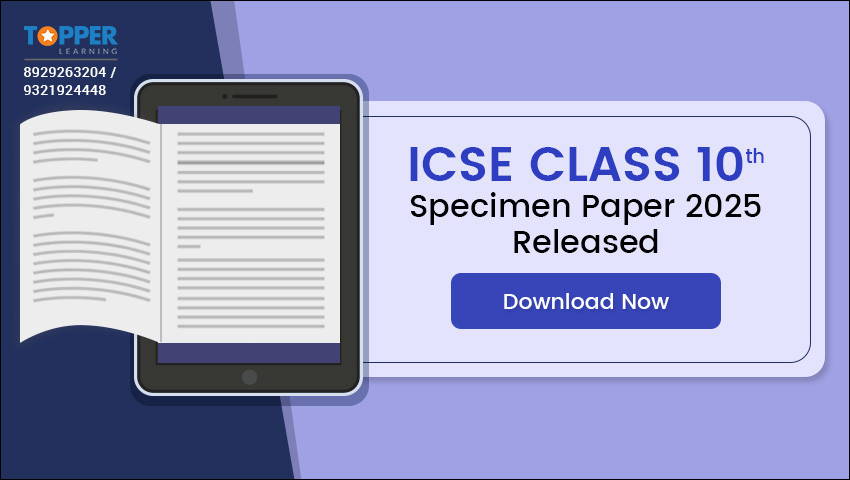
ICSE Class 10th Specimen Paper 2025 Released - Download Now
-
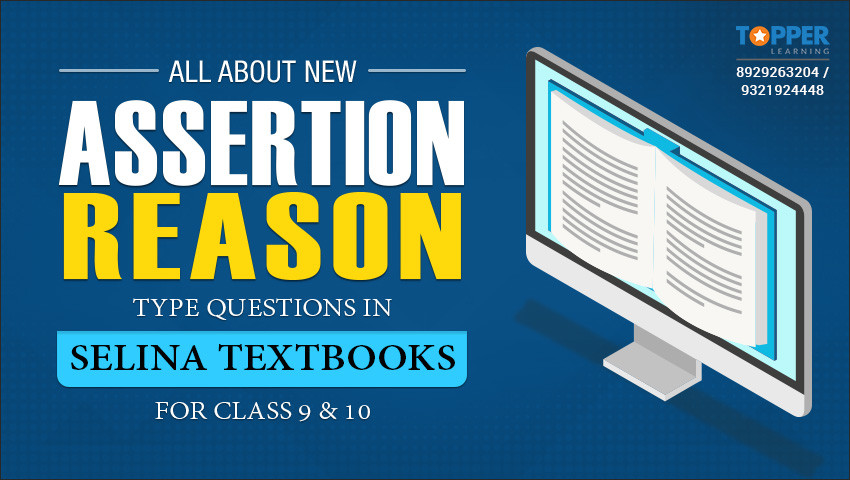
All About New Assertion Reason Type Questions in Selina Textbooks for Class 9 & 10
-
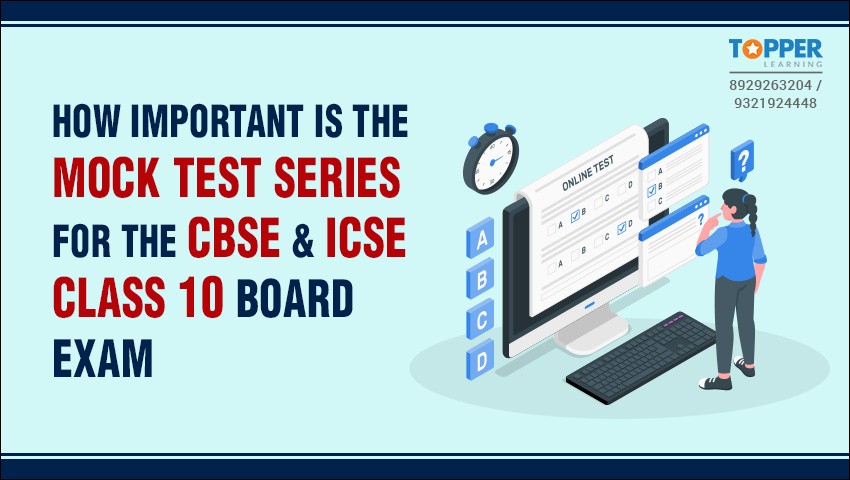
How Important is the Mock Test Series for the CBSE & ICSE Class 10 Board Exam
Frequently Asked Questions
- You should have passed class 9 and registered in class 10 of an ICSE-affiliated school.
- You will also require a minimum of 75% attendance in the academic session.
- You must have filled out the ICSE examination form and submitted it along with the required fee before the due date.
In class 10 of the ICSE curriculum, you must choose to appear in seven subjects from the three different groups. Out of these several subjects, three are based on your choice, and the rest four are compulsory subjects.
Group I comprises compulsory subjects, including English, a Second Language, and Social Sciences (History & Civics and Geography).
Group II includes Science, Mathematics, Economics, Commercial Studies, and more. Students have to choose any two subjects from Group II.
In Group III, students have to pick any one subject from Home Science, Fashion Designing, Computer Applications, and others. The complete list of subjects and ICSE Syllabus for each is available on the official ICSE website.
The passing criteria for the ICSE examinations consist of 33% of pass marks in the subjects. Initially, years before, the pass mark was 35%. But ever since the ICSE 2018 examination, the pass mark has been reduced to 33%.
Also, it is worth mentioning that pass certificates will be awarded to students who appear for exams in six subjects and score at least 33% in five subjects. So, the best 5 out of six apply for ICSE evaluation. However, these best five subjects must include English.The students who get PCNA (Pass Certificate Not Awarded) can appear for compartment exams provided they have passed English and three other subjects.
